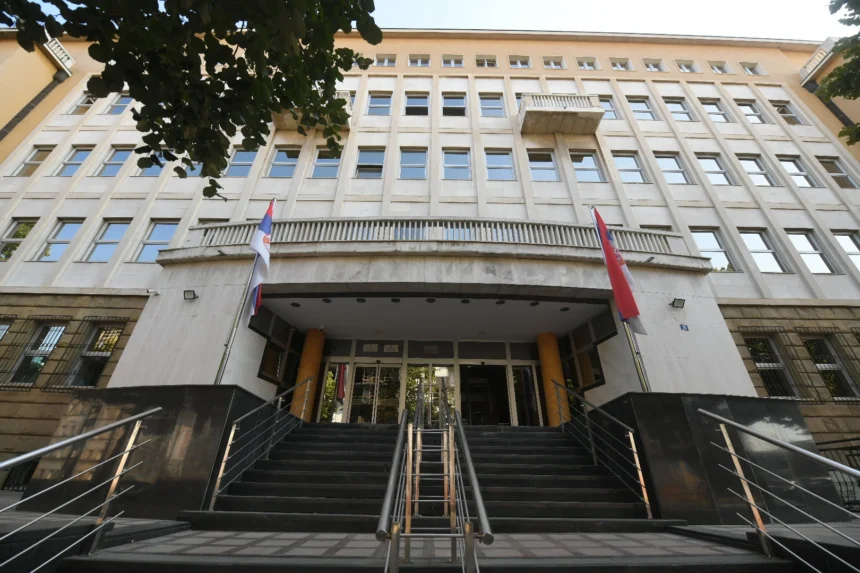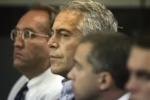The Prosecution for Organized Crime has issued a strong statement in response to announcements that its special jurisdiction may be abolished and subordinated to the Higher Public Prosecutor’s Office in Belgrade. The institution warns that the President of Serbia and other state officials are improperly commenting on ongoing cases, particularly the “Nadstrešnica” and “Generalštab” investigations, where evidence has been collected indicating reasonable suspicion of abuse of office by certain ministers.
They recall similar pressure in earlier high-profile cases such as “Jovanjica,” “Šarić,” “Ćuruvija,” and “Dijana Hrkalović.”
Below is the full translated statement:
Continuous Political Pressure
“In recent months, public prosecutors for organized crime have been subjected to continuous pressure through public statements made by the President of the Republic of Serbia, representatives of legislative and executive authorities, political actors, and certain media outlets. The decisions and criminal proceedings initiated by this office are being commented on improperly in an attempt to exert undue influence on their outcome.”
The statement emphasizes that the authorities are attempting to subordinate the Prosecution for Organized Crime, but prosecutors “have not and will not succumb to pressure,” insisting they will continue to act strictly in accordance with the law and their constitutional duties.
Prosecutors: We Are the Last Line of Defense Against Abuse of Power
The prosecution stresses:
“An independent prosecution, as a constitutional institution, is the last line of defense against abuse of power and authority.”
They warn that prosecutorial work must not become a matter of daily politics, and that facts, evidence, and the law are the only criteria guiding their actions.
Obstruction in Key Cases: “Nadstrešnica” and “Generalštab”
According to the statement, the moment the Prosecution began pre-investigative procedures in the high-profile cases known as “Nadstrešnica” and “Generalštab,” political and media targeting began. Once evidence emerged suggesting possible abuse of office by cabinet ministers, obstruction intensified.
The prosecution specifies that after arrests in the “Nadstrešnica” case:
- The Director of Police,
- The Director of the Tax Administration, and
- The Director of the Administration for the Prevention of Money Laundering
withdrew their approvals for members of the Joint Strike Team, refused to approve new members, and failed to deliver previously collected evidence, despite insistence and official requests.
This model of obstruction, they say, has been extended to other ongoing cases.
Political Attempts to Influence Justice Are Not New
The statement reminds the public of past attempts by executive officials to influence proceedings in cases like “Jovanjica,” “Šarić,” “Ćuruvija,” and “Dijana Hrkalović.”
Improper public statements—especially by top state officials—distort public perception, undermine the seriousness of criminal acts, and harm the personal security of prosecutors. Such statements are also used by defendants as arguments to request removal of assigned prosecutors.
Strong Opposition to Abolishing the Special Jurisdiction
The Prosecution condemns recent announcements by Uglješa Mrdić, head of the Justice Committee, supported by Justice Minister Nenad Vujić, proposing legal amendments that would abolish the Prosecution for Organized Crime and subordinate it to the Higher Public Prosecutor’s Office in Belgrade.
They warn that this represents:
“An open attempt at political influence and a severe attack on the constitutional and legal order.”
They also note that the European Commission, in its latest Progress Report, explicitly recommends that Serbia strengthen the powers of the Prosecution for Organized Crime to increase its effectiveness, not weaken it.
Final Warning: The Red Line Must Not Be Crossed
“This office has never been and will never be a tool of political interests. We will not conduct proceedings according to the expectations of the President of Serbia or any political actors.”
The statement concludes by calling on all political actors to refrain from inappropriate commentary and to respect constitutional limits.
“Preserving the independence of the Prosecution for Organized Crime is a red line that must not be crossed.”







